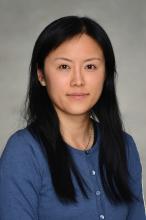
Min Dong
PhD
Professor
Electrical, Computer and Software EngineeringFaculty of Engineering and Applied Science
Best-in-class researcher explores energy efficient technologies to sustain wireless communications and storage solutions for energy systems.
Languages
English, Chinese
- PhD - Electrical and Computer Engineering & Minor in Applied Mathematics Cornell University, USA 2004
- BEng - Automation (Electrical Engineering) Tsinghua University, China 1998
Multi-Antenna Relay Network Beamforming Design for Multiuser Peer-to-Peer Communications
Florence, Italy May 9, 2014IEEE International Conference on Acoustics Speech and Signal Processing
Channel-Aware Distributed Dynamic Spectrum Access via Learning-Based Heterogeneous Multichannel Auction
Florence, Italy May 4, 2014IEEE International Conference on Acoustics Speech and Signal Processing
Optimal Power Allocation and Network Beamforming for OFDM-Based Relay Networks
Florence, Italy May 4, 2014IEEE International Conference on Acoustics Speech and Signal Processing
Real-Time Energy Storage Management with Renewable Energy of Arbitrary Generation Dynamics
Pacific Grove, California November 3, 201347th Asilomar Conference on Signals, Systems and Computers
Distributed Regulation Allocation with Aggregator Co-ordinated Electric Vehicles
Vancouver, British Columbia October 21, 2013IEEE International Conference on Smart Grid Communications
SNR-Based Channel Pairing for MABC-Based Two-Way Relaying
Darmstadt, Germany June 16, 201314th IEEE International Workshop on Signal Processing Advances in Wireless Communications
Learning-Stage Based Decentralized Adaptive Access Policy for Dynamic Spectrum Access
Vancouver, British Columbia May 26, 2013IEEE International Conference on Acoustics Speech and Signal Processing
Online Control for Energy Storage Management with Renewable Energy Integration
Vancouver, British Columbia May 26, 2013IEEE International Conference on Acoustics Speech and Signal Processing
Cooperative Relaying Optimization From Multichannel Resource Assignment to Multi-Antenna Processing Design
Shanghai Jiao Tong University, Institute of Wireless Communications, Shanghai, China 2012-08-27 August 27, 2012Invited Seminar
Resource Assignment and its Optimization in Multichannel Cooperative Relaying
McMaster University, Hamilton, Ontario December 1, 2011Invited Seminar
Best Paper Award
IEEE ICCC August 15, 2012Recipient of the Best Paper Award at the IEEE International Conference on Communications in China for her co-authored paper: On Codebook Design for Distributed Relay Beamforming Network.
Ontario Ministry of Research and Innovation Early Researcher Award
April 30, 2012One of only two recipients in the field of communications provincewide, Dr. Dong received the ERA for her research entitled: Building Green Communications Through Cooperation: Fundamental Limits and Practical Techniques. She is developing theories and technologies which will lead to new wireless solutions and infrastructures to improve energy efficiency and conservation while increasing the reliability, speed and range of communications.
Senior Member
IEEE November 1, 2012Dr. Dong has made significant contributions to the society in her field. Since 2013, she has been an elected member of the IEEE Signal Processing Society, and Signal Processing for Communications and Networking Technical Committee. Previously, she served as associate editor for IEEE Transactions on Signal Processing, a top-tier, flagship journal in the field of signal processing, as well as associate editor for IEEE Signal Processing Letters.
Best Paper Award
IEEE Signal Processing Society January 1, 2004Awarded for her co-authored paper: Optimal Design and Placement of Pilot Symbols for Channel Estimation, published in IEEE Transactions on Signal Processing, vol. 50, pp. 3055-3069, December 2002.
Professional Engineers Ontario
Institute of Electrical and Electronics Engineers (IEEE)
IEEE Communications Society
IEEE Signal Processing Society
- Introduction to Engineering (ENGR 1015U)
An introduction to engineering, the profession and core skills of engineers. Topics include: history of engineering; fields in engineering; how systems work; an overview of computer systems; information technology trends and state-of-the-art applications (scientific computing, communications and signal processing); role of engineers in society; core engineering skills including freehand sketching, basic engineering graphics and drafting techniques, engineering report writing and introduction to MAT programming; occupational health and safety, and safety standards. - Signals and Systems (ELEE 3110U)
Continuous-time and discrete-time signals and systems; basic system properties, linear time invariant (LTI) systems; impulse response and transfer function; autocorrelation and power spectrum; convolution; Fourier series, Laplace and Fourier transforms, frequency-domain representation and analysis in LTI systems; poles and zeros, stability of analog filters. - Wireless Communications (ELEE 4500U)
Digital wireless phones, cordless phones and wireless data; the first and second generation wireless mobile cellular network standards; characteristics of wireless propagation channels, including slow and fast fading, Doppler shift, multipath delay spread; bandpass transmission over wireless channels; digital modulation over wireless channels; wireless channel impairment mitigation techniques; fundamental of cellular communication concept, including cellular traffic and layout, frequency reuse, co-channel and adjacent channel interferences, call-processing, hand-off process; Multiple access techniques, including Frequency Division Multiple Access (FDMA)/ Time Division Multiple Access (TDMA), Code Division Multiple Access (CDMA), Orthogonal Frequency Division Multiplexing (OFDM). - Digital Communications (ELEE 4130U)
Digital Communications covers optimum receiver principles: AWGN, geometric representation of signals, maximum likelihood criterion and optimum decision regions, correlation receivers and matched filters, probability of error and union bound; digital bandpass modulation (FSK, PSK, QAM), baseband systems; performance comparisons: bit error rate, bandwidth, power, complexity; adaptive equalization techniques and algorithms; carrier and symbol synchronization; fundamental limits in information theory: entropy and the source coding theorem; channel capacity and the channel coding theorem; information capacity theorem and design trade-offs. - Advanced Wireless Communications (ENGR 5640G)
This course covers wireless communications systems, technologies and standards; statistical modeling of wireless channels; capacity of wireless channels; channel equalization; diversity techniques including time, frequency, code and space diversity; cooperative communications and user co-operation diversity; adaptive modulation; multiple antennas and space-time communications; multicarrier communications; multiuser communication and multiple access schemes; cognitive radio and game theory; and ad hoc and wireless sensor networks.